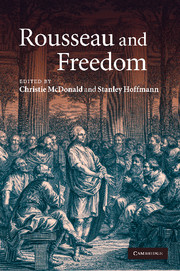Book contents
- Frontmatter
- Contents
- List of illustrations
- Notes on contributors
- Acknowledgments
- List of abbreviations
- Introduction
- PART I
- 1 Freeing man from sin: Rousseau on the natural condition of mankind
- 2 Making history natural in Rousseau's Discourse on the Origins of Inequality
- 3 Rousseau's Second Discourse: between Epicureanism and Stoicism
- 4 Jean-Jacques Rousseau and Diderot in the late 1740s: satire, friendship, and freedom
- 5 If you please! Theater, verisimilitude, and freedom in the Letter to d'Alembert
- 6 Music, the passions, and political freedom in Rousseau
- PART II
- PART III
- Bibliography
- Index
5 - If you please! Theater, verisimilitude, and freedom in the Letter to d'Alembert
Published online by Cambridge University Press: 05 May 2010
- Frontmatter
- Contents
- List of illustrations
- Notes on contributors
- Acknowledgments
- List of abbreviations
- Introduction
- PART I
- 1 Freeing man from sin: Rousseau on the natural condition of mankind
- 2 Making history natural in Rousseau's Discourse on the Origins of Inequality
- 3 Rousseau's Second Discourse: between Epicureanism and Stoicism
- 4 Jean-Jacques Rousseau and Diderot in the late 1740s: satire, friendship, and freedom
- 5 If you please! Theater, verisimilitude, and freedom in the Letter to d'Alembert
- 6 Music, the passions, and political freedom in Rousseau
- PART II
- PART III
- Bibliography
- Index
Summary
“Theater is a prison,” Rousseau writes in his Letter to d'Alembert on the Theater, “a dark prison indeed.” This prison Rousseau knows well, having himself been a captivated spectator and, with some degree of success, a captivating playwright. His imprisonment and subsequent escape from the shackles of theater bestowed upon him the authority and, at times, the elation of the survivor. The tone of Rousseau's Letter to d'Alembert conveys a sense of victorious conviction, not a reactionary and rancorous diatribe against theater written in the servitude of a monarchy of histrions. Instead, the Letter is composed by a free thinker in a free republic who aspires to liberate spectacles from theater.
In the Letter to d'Alembert, Rousseau offers a plethora of details on the pernicious nature of dramatic literature and theater houses. On several occasions, he describes theater with metaphors of incarceration:
But let us not adopt these exclusive Entertainments which close up a small number of people in melancholy fashion in a gloomy cavern, which keep them fearful and immobile in silence and inaction, which give them only prisons, lances, soldiers, and afflicting images of servitude and inequality to see.
For Rousseau, theater is not only a corrupted and corrupting art form, as was repeatedly and stridently declared before him, most notably by Plato, Tertullian, and Jacques-Bénigne Bossuet; theater is also a space that embodies the tyrannizing nature of the art it houses.
- Type
- Chapter
- Information
- Rousseau and Freedom , pp. 77 - 91Publisher: Cambridge University PressPrint publication year: 2010
- 1
- Cited by

